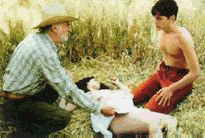
Latin Roots: The Eighth Annual Festival of Latin American Cinema
Written by Shannon O'Neill | Posted by: Anonymous
In 1636, Roger Williams, driven out of Massachusetts by the Puritans, founded Providence as a haven for people seeking freedom of expression and worship. Today Rhode Island’s capital city is again a haven of sorts as it hosts the Eighth Annual Festival of Latin American Cinema. A lack of distribution, both here and in Latin America, has made the Providence festival a creative refuge for Latin American directors of feature-length and short films. The week-long festival, at the Rhode Island School of Design (RISD) Auditorium from April 15-22, is relatively small, screening approximately a dozen films, but there is no shortage of independent spirit.
As festival coordinator Margaret Lewis of RISD explained, the birth of the idea was steeped in a combination of community and culture. "The festival started here because there was a Bolivian filmmaker, Ariel Gamboa, who was an expatriate. And, for reasons masked in history, he immigrated to Providence like a lot of Latin Americans do, and he saw a kind of cultural void for all the immigrant population here. He and his wife started the film festival. Then as it grew, more people signed on. Some years it was actually quite enormous; now we show maybe a dozen films."
Lewis found sponsorship, funding and a venue for the festival relatively easy to obtain. She says the enthusiasm with which the festival has been met is a function of the city’s culture. "Right now in municipal Providence, 40% of the population is Spanish-speaking — [A]nd our mayor, Vincent Cianci, Jr., is very much one to do things for the community. He’s been generous for many years. Last year BankBoston was a big sponsor. These people know what the population in the city is, so there hasn’t really been much hesitation about donating money to the festival."
What makes this festival unique is its focus on films made in Latin America exclusively; Spanish-language films from the United States or Spain are not considered for inclusion. As a rule, American and Spanish filmmakers, perhaps the best known of whom is first-time Oscar winner Pedro Almodovar ("All About My Mother"), enjoy many outlets for their films, while their Latin American counterparts do not.
"Latin American filmmakers are virtually shut-out of the market for mysterious reasons, so this is really their day," Lewis says. "In New England, this is the sole remaining film festival. A few years ago there was a spurt of activity, and Harvard ran one, and the MFA. There was one in Hartford and one in New York, but all of these have withered away. So this is it for our neck of the woods for these filmmakers."
Lewis explains that planning a Latin American film festival is "discouraging" to many interested parties. "[U]nlike Europe, which has a very good distribution system, and things pass across borders even within Europe very easily, in Latin America there’s no kind of continental distribution," she says. "So even between countries in Latin America, things aren’t easily passed back and forth."
Though the venues for Latin American film festivals have decreased on the East Coast over the last few years, it is not for a lack of interest or ingenuity on behalf of festival directors and participants. Rather, it is the lack of distribution in Latin America that makes films both hard to fund and difficult to view. The process that the Providence festival has gone through over the years to find entries is itself a daunting process.
"What we’ve been trying to do is build a network of independent filmmakers in those countries. But they don’t get to produce films as frequently as filmmakers here. So we send out a call for entries to everyone we know exists, but they don’t respond every year because they’re not in production. Some years, even a large country like Brazil — and this is for economic reasons — may only produce three or four films. So it’s kind of a logistical, I don’t want to say nightmare, to really keep at it and try to develop things all during the year contacting filmmakers," explained Lewis.
While the distribution and film-funding process may leave something to be desired, it has not had an effect on the creative process for most of these directors. Past entries have included topics ranging from political struggle to dark comedy, as Latin America itself has gone through many tumultuous changes over the last decades. As Lewis explained it, the themes of the films often mirror the times. "Recently, there’s been quite an extended trend. A lot of people are talking about political repression, coups that occur periodically in Latin America. I think that the reason why that has happened is because there has been a period of relative stability, so people have felt at ease with making art that deals with the subject. Now people are getting a little nervous again. My guess is that this trend my shrink back just as the continent is feeling a little nervous again. Latin Americans are more politically aware, or they certainly like to talk politics and believe that politics has a place in art making."
Unlike American films which often portray escapism, fantasy (think last year’s indie fave "The Blair Witch Project") or sardonic narratives, the Festival of Latin American Cinema’s entries are often grounded in a cultural awareness quite rare in American cinema. For instance, the winner of last year’s festival, "Acao entre Amigos" ("Friendly Fire"), a film by Brazilian director Beto Brant, was hailed for the fact that it dealt with the reality of Latin America.
"Brazilian political history is something that I think to most Americans, even if you pay attention to Latin America, it’s almost invisible. We focus on fun stuff from Brazil," explained Lewis. "But they had a very difficult political period the late ’60s and ’70s. And this film, in a very interesting narrative, recounted in the survivors an episode of torture and how they were going to avenge themselves many years later. And the jury selected that — it was a very good film, very beautifully done by a young filmmaker Beto Brant — but the reason that it really struck them [was] they thought more than any other film at the festival it addressed the reality of Latin America. So for them political content is almost an aesthetic value, or super-aesthetic value."
In addition to screenings, this year’s festival organizers will give a lifetime achievement award to Argentine filmmaker Fernando Birri, accompanied by a selection of films which demonstrate the range of his work, from fiction to documentary and experimental video.
The difference in the aesthetics of these films, both Birri’s and the newer filmmakers’ who will be spotlighted, from general festival circuit fare is what makes the Eighth Annual Festival of Latin American Cinema refreshing. With a combination of content and commitment, the festival presents perspectives that are hard to come by elsewhere.
Admission to the festival is free, and all films are open to the public. Call 401-454-6591 for more information, or visit the Web site, http://www.angelfire.com/ri/newlaff/.









